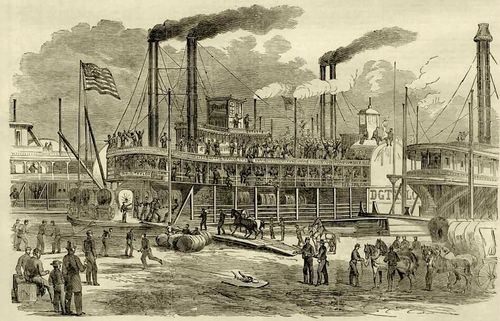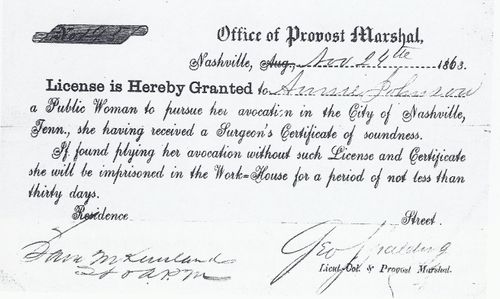Annotation:Smoky Row
X:1 T:Smoky Row T:Smokey Row [1] S:Doc Roberts (1897-1978, Richmond, Madison County, Ky.) M:C| L:1/8 R:Reel Q:"Quick" D:Champion Records 15564 (78 RPM), Fiddlin' Jim Burke (1928) N:Jim Burke was a pseudonym for Doc Roberts F:https://www.slippery-hill.com/recording/smoky-row Z:Transcribed by Andrew Kuntz K:G ga |bgaf g2d2|efge d2ga|bgaf g2gd|e2d4 g(a| b)gaf g2ag|efge dged|BAGB AGEG|1[M:3/2]A2 G4 [G,4D4]:|2[M:C|]A2G4|| |:dc|BAGB AGEG|DEGA Bcdc|BAGB AGE-G|A2G4:| ([Dd]c|[D2B2])GB- AG2B|AG[GB]A Bcd(c|B2) GB- AGE-G|A2 G4||

By 1863 the problem had become so acute that the military decided it must take action, lest the situation serious disrupt the army. Together with the police force they rounded up all the prostitutes of the city and loaded them forcibly onto the steamer Idahoe for transit North to Louisville. Although well satisfied for a short while, unintended consequences arose in that the extirpation of the white prostitutes from the district created a vacuum that was soon filled by black prostitutes. In addition, when the Idahoe finally made its way to Louisville the authorities there refused to let the women debark; and similarly when the steamer tried to land at Cincinnati, Ohio, and Covington and Newport, Kentucky. By August 4th, nearly a month after setting off with their unwanted cargo, the steamer returned to Nashville and their cargo finally emerged, quickly returning to their original trade. A more humane and and at the same time much more effective plan was then conceived to control prostitution through licensing it, while at the same time setting up medical facilities to treat both the women and men when needed....there was an old saying that no man could be a soldier unless he had gone through Smokey Row... The street was about three fourths of a mile long and every house or shanty on both sides was a house of ill fame. Women had no thought of dress or decency. They said Smokey Row killed more soldiers than the war.[1]

There was a similar "Smoky Row" in Memphis serving the river trade, and undoubtedly other 'Smoky Rows'.
- ↑ James B. Jones, Hidden History of the Civil War Tennessee, 2013, Chapt. 2.

